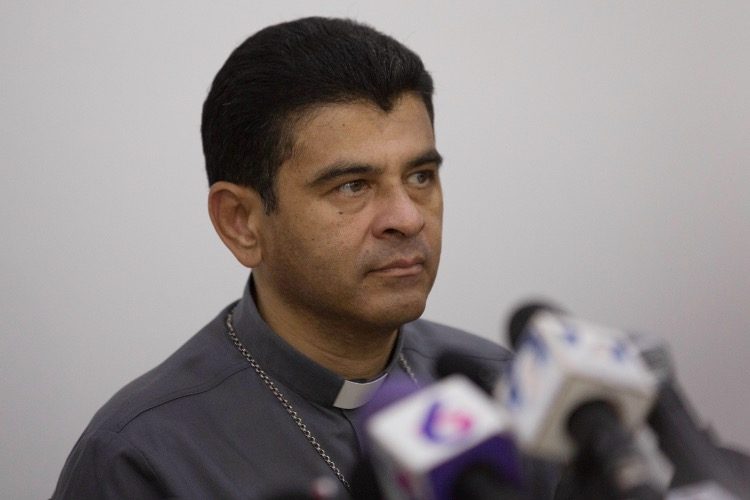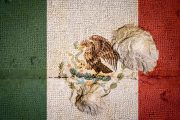
On Sunday, the communist dictatorship of José Daniel Ortega in Nicaragua expelled imprisoned Catholic bishop Rolando Álvarez and 18 other priests to the Vatican. With the exception of one who remained in Venezuela, all prelates were welcomed in Rome by Vatican authorities.
Bishop Isidoro Mora, 15 priests, and two seminarians who were detained in Nicaragua were expelled from the country along with Álvarez.
The Ortega government declared in a press statement that the recent releases on January 14 were part of talks with the Vatican aimed at “making possible their trip to the Vatican.” In the past, jailed priests have been quickly flown to Rome.
Vatican News, the Vatican’s in-house media operation, verified that the group arrived in Rome on Sunday afternoon and were welcomed as “guests of the Holy See.”
In turn, Nicaragua thanked Pope Francis and other Church members for “the very respectful and discreet coordination carried out to make possible the trip to the Vatican” for the clergymen, in a statement published on local media outlet El 19.
During the Angelus at the beginning of 2024, Pope Francis spoke of the situation of bishops and priests “deprived of their freedom” in the Central American nation. The pontiff then assured everyone of his “closeness in prayer” and invited people to pray for Nicaragua, voicing his hopes “that the path of dialogue will always be sought to overcome difficulties.”
Nicaragua’s ongoing suppression of Catholics recently witnessed the arrest of six clergy representing the Archdiocese of Managua.
Bishop Álvarez, who has been jailed for more than a year, became a key example of the communist government’s persecution of Catholics. Earlier, Ortega had begun negotiations to release the bishop but sent him back to prison when the religious leader declined to adhere to threats of exile. The bishop had been under house arrest for his public criticism of Ortega since August 2022 before his recent release.
“Thank God he is gone, exiled but now free,” a family member of one of the expelled clergy members said of Bishop Álvarez.
Mora was arrested in December for proclaiming at a mass that he was praying for Bishop Álvarez, sources said.
Since suppressing popular protests in 2018 that called for his resignation, Ortega’s communist government has systematically silenced dissenting voices and focused its fury on the Catholic Church, including seizing the prestigious Jesuit-run University of Central America in August.
“The university was the only center of independent thought left in the country,” bemoaned Juan Diego Barberena, a lawyer who fled to Costa Rica. He studied at the institution, known as UCA, between 2014 and 2017.
However, Ortega’s government called the university a “center of terrorism” and confiscated its property, buildings, and bank accounts on August 16. A week later, the Jesuit religious order was outlawed and all of its assets were confiscated. A new institution was scheduled to replace UCA, though further details remain unclear.
Nicaragua’s Congress, dominated by Ortega’s Sandinista National Liberation Front, has ordered the closure of over 3,000 nongovernmental organizations, including Mother Teresa’s charity.
The government has not issued any statements explaining the alleged crimes committed by imprisoned priests or reasons for their arrests. Nonetheless, since the 2018 protests, Ortega has accused church leaders of seeking to overthrow his government.
At the time, Bishop Álvarez sparked Ortega’s particular ire by refusing to voluntarily leave Nicaragua, choosing instead to suffer the brunt of Ortega’s persecution with fellow Christians in Nicaragua. Immediately after his refusal to leave, the bishop was convicted on questionable charges of being “a traitor to the country” and sentenced to 25 years in prison.
Late last year, exiled Nicaraguan Catholics testified before the U.S. Congress about the extent to which the persecution has already reached, including harsh interrogations and torture. Congressman Chris Smith (R-N.J.), chair of the House Foreign Affairs Subcommittee on Global Human Rights, listened to the testimony of exiled prisoners of conscience and their relatives.
During a U.S. congressional hearing on November 30, one exiled prisoner of conscience stated that the Ortega regime used the largely unsubstantiated claim that Catholic priests and bishops were organizers of a failed coup d’état against the Nicaraguan government and were plotting another overthrow as an excuse for persecuting the Catholic Church in the country.
“We were accused of being members of an organized crime gang and that the leaders were the bishops, and above all, they said Rolando,” the first witness stated. “I was interrogated, and I was accused of giving hate speeches, of organizing an uprising. I was accused of undermining the dignity of the state and of Nicaragua, of spreading false news.”
“They always addressed the Monsignor [Bishop Álvarez] as if he were the thinking head and the organizer of the failed coup d’état and of wanting to organize a new coup. The aforementioned shows the great ignorance that the government and other authorities have of the prophetic role and the evangelical commitment of the bishops.”
Additionally, a second exiled prisoner of conscience, who was arrested with Bishop Álvarez, recalled the kidnapping of the bishop with his curia and the subsequent interrogations and trial that sought to blame the bishop for being the head of an alleged coup.
“These injustices increased in April 2018 when armed paramilitary groups and police violently repressed young people who were protesting in the streets of some departments of the country against the Social Security reforms carried out by the government,” the witness stated.
“Bishop Rolando Álvarez and some of his clergy came to the defense of the demonstrators, and some of the churches served as shelters and clinics for young people fleeing repression and being wounded by police and ruling party members.”
Besides, a mother of a prisoner of conscience testified that her son was kidnapped by Sandinista police and subsequently tortured with other prisoners during the government suppression of civilians against which the Church in Nicaragua, including Bishop Álvarez, had raised its protest.
“In the city of Matagalpa, on May 15, the Sandinista police and paramilitary groups attacked the young demonstrators. The Catholic priests interceded and achieved a ceasefire,” the mother recounted. “The Catholic Church opened the doors of its churches to protect the life and integrity of the students and demonstrators.”




